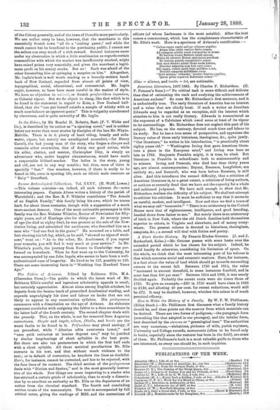American Literature, 1607-1885. By Charles F. Richardson. (G. P. Patnam's
Sons.)—" No critical task is more difficult and delicate than that of estimating the rank and analysing the achievements of
American authors." So runs Mr. Richardson's first sentence, and it. is undoubtedly true. The early literature of America has an interest
and a value that are chiefly local. If such a writer as Jonathan Edwards may be regarded as an exception, still the interest which attaches to him is not really literary. Edwards is remembered as the exponent of a Calvinism which owed some at least of its vigour to its surroundings. Mr. Richardson does not neglect this part of his subject. He has, on the contrary, devoted much time and labour to
its study. But he has a true sense of perspective, and appraises the literary value of these early historians, theologians, &a, quite justly.
"Our literature," he writes in his introduction, "is practically about eighty years old." "Washington Irving first gave American litera- ture a place in the European mind," and Irving was born as.
late as 1783. Benjamin Franklin might, it is tree, be cited. Bat literature in Franklin is subordinate both to statesmanship and to science. Irving and Prescott, who died less than thirty years ago, are almoat contemporaries ; Bryant, Emerson, Longfellow, are entirely so; and Bancroft, who was born before Emerson, is still alive. And this introduces the second difficulty, that a criticism of
American literature is, to a great extent, a criticism of living authors5 or authors so recently dead that we have not the capacity for a whole
and unbiassed judgment. We have said enough to show that Mr.
Richardson realises the difficulty of his subject. We shall not attempt to criticise his criticism. It must be sufficient to say that it seems to-
ns careful, modest, and intelligent. Now and then we find a trace of what we may call "buncombe." "There is no aristocracy in the United States save that of righteousness, intelligence, and good breeding, handed down from father to son." But surely there is an aristocracy of birth in New York, where the old Dutch families hold themselves superior to others, in Virginia and elsewhere, and of money every- where. The present volume is devoted to historians, theologians,. essayists, Sm.; a second will deal with fiction and poetry.


















































 Previous page
Previous page